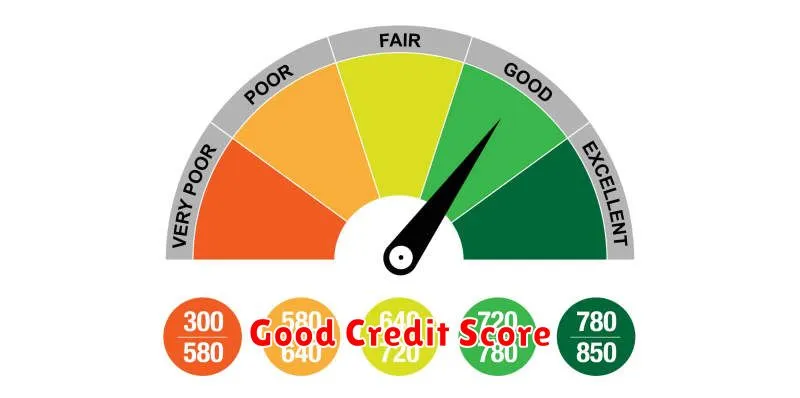Are you dreaming of buying a new home, a shiny new car, or maybe even a dream vacation? While those aspirations might seem far off, a good credit score can be the key to unlocking those opportunities. In today’s world, a strong credit score is more than just a number; it’s a passport to financial freedom and the ability to make major purchases. From securing competitive interest rates to securing loan approvals, a high credit score can significantly impact your financial well-being.
Don’t underestimate the importance of building a good credit score, especially when it comes to major purchases. Whether you’re planning a big move, expanding your family, or simply wanting to upgrade your lifestyle, a solid credit history can be your secret weapon. By understanding how your credit score impacts your financial options, you can take control of your future and achieve your financial goals with confidence.
Understanding Credit Scores
A credit score is a numerical representation of your creditworthiness. It reflects how likely you are to repay borrowed money based on your past financial behavior. Lenders use credit scores to assess your risk and determine the interest rate you’ll qualify for on loans, credit cards, and other financial products.
The higher your credit score, the lower your interest rates will be. This means you’ll pay less in interest over the life of a loan. Conversely, a low credit score will likely result in higher interest rates, making it more expensive to borrow money.
Credit scores are calculated by credit bureaus like Experian, Equifax, and TransUnion. They consider factors such as:
- Payment history: This is the most important factor, accounting for 35% of your score. It shows how consistently you’ve paid bills on time.
- Amounts owed: This accounts for 30% of your score and reflects your debt levels relative to your available credit.
- Length of credit history: This represents 15% of your score and shows how long you’ve been managing credit responsibly.
- New credit: This accounts for 10% of your score and considers how often you apply for new credit.
- Credit mix: This makes up 10% of your score and assesses the diversity of your credit accounts (e.g., credit cards, loans).
Understanding your credit score is essential for managing your finances effectively. By monitoring your credit report and taking steps to improve your score, you can secure better interest rates and access more favorable financial products.
How Credit Scores Affect Loan Rates
Your credit score plays a crucial role in determining the interest rate you’ll receive on loans. Lenders use your credit score as a gauge of your creditworthiness, which essentially reflects your ability and willingness to repay borrowed funds. A higher credit score generally translates to a lower interest rate, and vice versa. This is because lenders perceive borrowers with excellent credit as less risky.
Let’s break down how credit scores influence loan rates:
- Lower Risk, Lower Rates: When you have a good credit score, lenders see you as a responsible borrower with a history of timely payments. They are more confident in your ability to repay the loan, so they offer you lower interest rates, leading to significant savings over the loan’s lifetime.
- Higher Risk, Higher Rates: Conversely, if you have a low credit score, lenders perceive you as a higher risk. To compensate for this perceived risk, they charge higher interest rates to ensure they are adequately compensated for the possibility of default. This means you could end up paying much more in interest over the loan’s term.
The difference in interest rates between borrowers with good and bad credit can be substantial, impacting the affordability of major purchases. For example, a borrower with a credit score of 700 or above might qualify for a mortgage at a 4% interest rate, while someone with a score below 600 might be offered a rate of 7% or higher. This difference in interest rates could translate to thousands of dollars in additional costs over the loan term.
Therefore, prioritizing a good credit score can save you significant money on interest payments when you take out loans for major purchases like cars, homes, or even small business ventures.
Impact on Mortgage Approvals and Rates
A good credit score is crucial when applying for a mortgage. Lenders use your credit score to assess your risk as a borrower. A higher credit score signifies lower risk, leading to more favorable terms and a higher chance of approval. Conversely, a low credit score can make it difficult to get approved for a mortgage or result in higher interest rates.
A higher credit score allows you to qualify for better mortgage rates. This means you’ll pay less interest over the life of your loan, saving you significant money. In addition, lenders often offer lower down payment requirements for borrowers with excellent credit.
If you have a lower credit score, you might face a higher interest rate, stricter terms, and may even be denied a loan. This can impact your ability to purchase a home or make it significantly more expensive.
To improve your chances of securing a favorable mortgage, it’s essential to maintain a good credit score by paying bills on time, keeping credit utilization low, and avoiding unnecessary credit applications.
Auto Loans and Creditworthiness
When it comes to major purchases like cars, your credit score plays a significant role in determining your loan eligibility and interest rates. Creditworthiness is a measure of your financial responsibility and ability to repay loans. Lenders use your credit score to assess your risk, and a higher score generally indicates lower risk. This translates to better loan terms, including lower interest rates and longer repayment periods.
A good credit score can save you thousands of dollars in interest over the life of an auto loan. Conversely, a poor credit score can lead to higher interest rates, making your car purchase significantly more expensive. In some cases, a poor credit score can even make it difficult to secure an auto loan altogether.
To improve your creditworthiness for an auto loan, focus on building a positive credit history. This includes paying your bills on time, keeping credit card balances low, and avoiding unnecessary credit inquiries.
By understanding the link between auto loans and creditworthiness, you can take steps to improve your financial position and get the best possible loan terms for your next car purchase.
Credit Cards and Credit Limits
When applying for a credit card, you’ll be assigned a credit limit. Your credit limit represents the maximum amount of money you can borrow using your credit card. It is important to note that this is not the amount you are required to spend; you are allowed to spend less, but you should never spend more than your available credit.
It is crucial to manage your credit limit wisely. If you consistently use a large portion of your available credit, your credit score may suffer. Lenders use credit utilization to determine how responsible you are with your debt.
Aim to use no more than 30% of your available credit on all your cards combined to maintain a good credit score. You can increase your credit limit by requesting an increase from your credit card issuer, demonstrating good financial responsibility, and having a good payment history. This can be a useful strategy to lower your credit utilization and improve your credit score.
Securing Favorable Interest Rates
One of the most significant advantages of having a good credit score is the ability to secure favorable interest rates on major purchases. When you apply for a loan, such as a mortgage, auto loan, or personal loan, lenders evaluate your creditworthiness. A higher credit score indicates a lower risk to the lender, leading to more competitive interest rates. This translates to lower monthly payments and significant savings over the life of the loan.
Lower interest rates mean that you pay less interest on your loan, allowing you to keep more of your hard-earned money. For instance, a 1% difference in interest rates on a $300,000 mortgage over 30 years could save you tens of thousands of dollars in interest payments.
Moreover, a good credit score can unlock access to special financing offers and discounts. Many lenders offer incentives to borrowers with excellent credit, such as lower APRs, cash rebates, or extended warranties. This can result in significant savings and benefits beyond just lower interest rates.
Negotiating Down Payment Requirements
A strong credit score can be a valuable tool when negotiating down payment requirements for a major purchase. Lenders are more likely to offer lower down payments to borrowers with excellent credit, as they pose a lower risk. This is because individuals with good credit histories are seen as more reliable and likely to repay their loans on time.
When you have a good credit score, you can leverage this advantage to negotiate with lenders. You may be able to secure a loan with a lower down payment, potentially saving you thousands of dollars upfront. This can significantly impact your overall budget and make major purchases more attainable. Moreover, lenders may offer you more favorable interest rates and loan terms, further reducing your overall financing costs.
To maximize your negotiating power, be prepared to present your strong credit history and financial stability to lenders. This can include providing documentation such as your credit report, income statements, and debt-to-income ratio. By demonstrating your financial responsibility, you increase your chances of getting a better deal on your loan.
The Role of Credit in Rental Applications
A good credit score is not just important for securing loans; it also plays a crucial role in your ability to rent a property. Landlords use your credit history as a gauge of your financial responsibility and likelihood of paying rent on time. A strong credit score demonstrates to potential landlords that you’re a reliable tenant and less likely to default on your lease.
When reviewing applications, landlords typically check your credit score to assess your payment history, credit utilization, and overall financial stability. A low credit score could raise red flags and make it harder for you to secure a rental. Landlords might be hesitant to rent to someone with a poor credit history as it suggests potential financial instability, which could lead to late rent payments or even eviction.
In addition to your credit score, landlords may also review your rental history. This information is often included in a credit report and can provide valuable insights into your past tenancy behavior. However, even with a solid rental history, a low credit score could still be a barrier to securing a lease.
Therefore, building and maintaining a good credit score is essential not just for securing loans but also for finding a suitable rental property. It’s crucial to understand how your credit score impacts rental applications and prioritize building a strong financial history for future housing needs.
Building and Maintaining Good Credit
Having a good credit score is crucial when it comes to making major purchases, as it influences your ability to secure loans, mortgages, and even rental agreements at favorable terms. Building and maintaining good credit is an ongoing process that requires discipline and responsible financial practices.
One of the most important steps in building good credit is to pay your bills on time. Late payments can significantly damage your credit score, so make it a priority to set reminders and ensure that your bills are paid before the due date. Additionally, avoid maxing out your credit cards, as high credit utilization can negatively impact your score. Instead, aim to keep your credit utilization ratio below 30% for optimal credit health.
Another key aspect of building credit is establishing a positive credit history. This can be achieved by applying for a credit card and using it responsibly. Make sure to make regular payments, keep your balances low, and avoid closing old accounts, as this can negatively impact your credit score.
Beyond responsible credit card use, you can further enhance your credit score by taking advantage of other credit products like installment loans. These loans are often associated with fixed monthly payments, which can help you build a consistent track record of on-time payments and increase your credit history.
Monitoring your credit score regularly is also essential. This allows you to stay informed about your financial health and identify any potential issues early on. You can access your credit score through free services offered by various credit bureaus or through credit monitoring apps.
Building and maintaining good credit takes time and effort. By adhering to these strategies, you can establish a strong credit history and improve your financial standing, paving the way for future financial opportunities.
Consequences of a Low Credit Score
A low credit score can have serious financial consequences, making it harder to achieve important financial goals. Lenders use credit scores to assess your creditworthiness, which influences the interest rates and terms they offer you.
A low credit score can lead to:
- Higher interest rates: Lenders perceive individuals with low credit scores as higher risk, resulting in higher interest rates on loans, credit cards, and mortgages. This means you’ll end up paying significantly more over the life of the loan.
- Loan denial: Lenders may simply refuse to provide you with a loan if your credit score is too low, hindering your ability to make major purchases or achieve financial goals.
- Higher insurance premiums: Insurance companies also consider credit scores, and those with lower scores often pay higher premiums for things like auto and homeowners insurance.
- Limited rental options: Landlords often check credit scores to assess potential tenants’ reliability. A low credit score can make it difficult to secure a desirable rental property.
- Difficulty securing employment: Some employers use credit scores as a screening tool, potentially limiting your job opportunities.
To avoid these consequences, it’s essential to maintain a good credit score. This involves paying bills on time, keeping credit card balances low, and using credit responsibly.
Strategies for Improving Your Credit Score

Having a good credit score is crucial for securing loans, credit cards, and even renting an apartment. A higher credit score often translates to lower interest rates and better terms, ultimately saving you money in the long run. If you’re aiming to improve your credit score, there are several effective strategies you can implement:
1. Pay Your Bills on Time: Timely payments are the cornerstone of a healthy credit score. Setting reminders and automating payments can ensure you never miss a due date. Late payments can significantly damage your score, so promptness is paramount.
2. Keep Credit Utilization Low: Credit utilization ratio refers to the amount of credit you use compared to your available credit limit. Aim to keep this ratio below 30%, ideally even lower. This demonstrates responsible credit management and helps boost your score.
3. Avoid Opening Too Many New Accounts: Each time you apply for a new credit card or loan, a hard inquiry is placed on your credit report, potentially lowering your score. Focus on managing existing accounts responsibly instead of opening new ones frequently.
4. Check Your Credit Report Regularly: Errors on your credit report can negatively impact your score. Reviewing your credit report from all three major bureaus (Equifax, Experian, and TransUnion) annually helps identify and dispute any inaccuracies.
5. Consider a Secured Credit Card: If you have limited credit history, a secured credit card can be a valuable tool. You deposit a security deposit, which acts as collateral, and responsible use can help build your credit score.
6. Become an Authorized User on a Responsible Account: If you have a trusted friend or family member with a strong credit history, becoming an authorized user on their account can positively impact your score. However, ensure the account is well-managed before joining.
Improving your credit score requires patience and consistency. By adopting these strategies and making responsible financial decisions, you can gradually increase your score and unlock favorable financial opportunities.
Credit Monitoring and Identity Theft Protection

A good credit score is crucial when you’re making a major purchase, and it’s also important for protecting your financial well-being. Credit monitoring and identity theft protection are essential components of a robust financial security plan.
Credit monitoring allows you to keep track of your credit report and identify any suspicious activity. It can alert you to potential identity theft, such as unauthorized credit card applications or fraudulent inquiries. By staying informed, you can quickly address any discrepancies and prevent further damage to your credit score.
Identity theft protection goes beyond credit monitoring, providing comprehensive safeguards against a wider range of identity-related threats. These services may offer features like fraud insurance, credit score monitoring, and expert assistance in resolving identity theft cases.
By investing in both credit monitoring and identity theft protection, you can gain peace of mind knowing that your credit history and financial information are safeguarded. These services act as an early warning system, allowing you to react swiftly to potential threats and mitigate the negative consequences of identity theft.
Seeking Professional Financial Advice

Once you understand how a credit score works and how it impacts your financial life, you can start taking steps to improve it. A good credit score can be your best friend when making a major purchase, as it can open doors to lower interest rates and better loan terms.
If you’re feeling overwhelmed by the process of building credit, consider seeking professional financial advice from a qualified financial advisor. They can provide you with personalized guidance and help you create a plan that fits your unique circumstances.
A financial advisor can help you understand the various aspects of credit, from budgeting and debt management to building a strong credit history. They can also provide valuable insights into how to negotiate with lenders and secure the best possible financing options for your major purchase.
Seeking professional financial advice is a smart move when you’re planning a significant purchase. A financial advisor can act as your guide, helping you navigate the complexities of credit and finance, ultimately leading you toward a more financially secure future.

